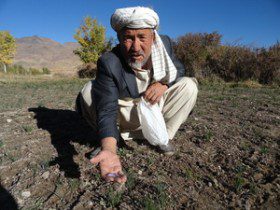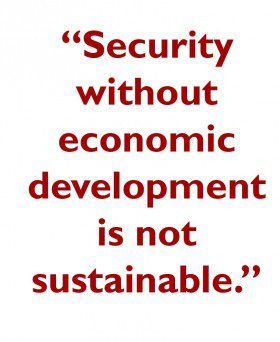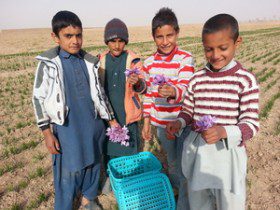
One of the farmers from the Wardak Province in the central east region of Afghanistan. Photo courtesy of Rumi Spice.
Rumi Spice, founded by a group of US military veterans who served in Afghanistan, has a unique tool for peace in Afghanistan: Saffron. By working with Afghan farmers to create a direct market to produce and sell saffron globally, they believe they can ultimately help the country achieve long term economic stability. Several of the co-founders are Harvard Business School alums.
Afghanistan’s future lies with small farmers – The Boston Globe
How Afghanistan Vets Are Trying To Cultivate Peace Through Saffron – NPR
SAI recently spoke with co-founder Keith Alaniz, a US Army veteran who worked in Afghanistan from 2011 to 2014, about the philosophy of the organization and the future of Afghanistan.
SAI: Can you give us some background for the organization, and how your time in Afghanistan influenced you?
Keith Alaniz: The idea came about through my contacts in Afghanistan working to build stability and support for the Afghan government. I noticed that a lot of farmers, even though they had the capacity to produce more crops, weren’t going to do it because their crops would just be disposed in the fields. They didn’t have a market for their goods.
The best thing would be for them to sell nationally, but very few of them can sell all across Afghanistan. Often it was hyper locally, within the district or province. So you see a lot of NGOs that are doing great work to help the farmers, but without a market they weren’t going to increase their yields.

About 85% of Afghanistan is rural, and the agricultural economy is undeveloped and still represents the largest portion of the economy. But the war completely isolated the rural workers in the international economy.
SAI: Why did you choose to focus on saffron?
KA: In the States, specifically after 2013, 28,000 kgs of saffron have been imported, which is actually quite large for a country that doesn’t traditionally use saffron. The reason why we [Rumi Spice] chose saffron is because Afghanistan produces some of the highest quality saffron in the world. It’s so valuable; the price-to-weight ratio is very high.
SAI: Your organization puts an emphasis on building relationships with Afghan farmers. Why is this so important?
KA: One of the obstacles to foreign direct investment in Afghanistan is the lack of any robust legal structures there, especially with commercial law and contract law. That makes it really important to have relationships on the ground with the producers, and to have a trusted partnership. Otherwise, to them we’re just foreigners, and they don’t know if we are just going to leave without fulfilling our end of the bargain. We need to make sure that our producers are getting the right quality and actually getting the product we ordered.
We operate with a representative in Herat province who has an established relationship with the farmers. So in the absence of any contract laws, it’s all based on relationships. If you’re from an area, you’re not going to wrong someone in a contract, and that reflects poorly on your family. That’s actually part of an honor code and culture [in Afghanistan]. They [the Afghans] have these peace mechanisms in lieu of contract laws. But if you are working outside of these mechanisms, you really don’t have any other safeguards to do business in Afghanistan.
SAI: How did you use your military experience to build these relationships?
KA: In 2012, I was working in the construction sector in Afghanistan, so I saw how business was done locally and how important it was to have relationships on the ground. I used that experience, coupled with language skills. It’s a great groundbreaker to be able to explain complex topics in their native language.
SAI: How about this idea that saffron is an alternative to poppy and opium farming, since opium is one of the primary sources of income for the Taliban. How does that play into your mission?
KA: Correct, opium is a strategic commodity for the Taliban, and not just the Taliban, but other insurgent groups as well. A byproduct of our [Rumi Spice’s] success is that we are creating a viable economic alternative for the farmers. Instead of growing opium, they can grow saffron.
Markets dictate the prices of both opium and saffron. Some numbers indicate that they [the Afghan farmers] can grow six times more income growing saffron as opposed to poppies. The Afghans realize that opium is illegal both under their religion and their government. Opium farmers always run the risk of their fields being eradicated. Then you have the social stigma of growing a drug.
So they grow it [opium] out of necessity and a lack of a better alternative. What saffron does is give them that viable alternative.
A lot of what we are doing is creating a market and really creating an Afghan brand. Especially here in the States, you don’t always associate Afghanistan with anything positive. So what we want to do is show that Afghanistan actually does have good products. We are leveraging the power of the American consumer economy to increase stability in Afghanistan.
One of the biggest challenges is just getting the word out there. One of our challenges will be to educate the average American consumer about saffron and what it can be used for.
Visit Rumi Spice’s website for recipe ideas.
SAI: From your perspective, what do you see for the future of Afghanistan? How will the military, political, and economic perspectives come together to pave the path forward for the country?
KA: That’s exactly it – it has to be military, political, and civil society, and especially economic issues that have to come together. The military carries a heavy load in Afghanistan, mostly focused on security. But security without economic development, and building the private sector, is not sustainable.
We are trying to catalyze market-driven development. We want to see the Afghan farmers develop their capacity because there is a market for their goods. Since we started working in November, the farmers we work with have doubled their capacity on their own.
In general, I am very optimistic for the long term prospects for Afghanistan. I think the arrangement between Ashraf Ghani and the Chief Executive Abdullah is a very unique Afghan solution to an Afghan problem. Although, in the West, there are different opinions about that.
I know that the government is very focused on sustainability and development, so now the international community can’t leave Afghanistan hanging, especially with security needs.
When you have young men who can make a living peacefully, they are less susceptible to extremism. They don’t want to wage war – they want to go back to their farms. They are peaceful people who have experienced 30 years of war.
Updated 3/6: Congrats to Rumi Spice, which selected as one of the top 10 finalists in the President’s Challenge at the Innovation Lab at Harvard. Read more: http://news.harvard.edu/gazette/story/2015/03/into-the-finals/
This interview has been edited lightly for clarity and length.
-Meghan Smith

